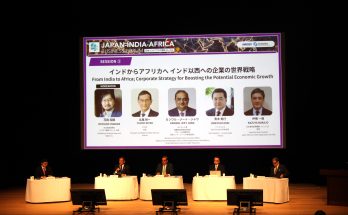The AU’s full participation in the G20 would increase the legitimacy of the grouping, while also providing a platform for a continent that is under-represented in the G20, says Elizabeth Sidiropoulos.
By Elizabeth Sidiropoulos
Prime Minister Narendra Modi’s request to his G20 counterparts in June 2023 to invite the African Union to become a permanent member of the grouping was a bold step that vocalised the views of many in Africa and beyond about the importance of having a collective African voice at the G20 table. The G20 is not the UN; it’s an exclusive, select group. The value of such a small grouping is that it can build consensus among systemically important countries on key global challenges. The downside is that it may ignore, knowingly or unknowingly, the potential consequences of its decisions on the most vulnerable economies.

Africa is home to 33 of the world’s least-developed countries. About a third of its population lived below the extreme poverty line in 2022 (431 million people). Achieving sustainable development is an existential necessity for all these people. Many African countries are unlikely to meet all the SDGs by 2030. In many cases, there is insufficient credible or timely data for effective monitoring and policymaking. Coupled with the imperative of an energy transition, the scale of resources needed to achieve the SDGs runs into trillions of dollars. These challenges cannot be dealt with only through domestic policymaking. They also require a global architecture geared towards effective financing for development. And this is where the G20’s mandate as the world’s premier global economic governance forum becomes crucial for the continent and indeed all of the Global South. Hence, the invitation to the AU serves as more than a symbolic gesture. The AU’s full participation in the G20 would increase the output legitimacy of the club, while also providing a platform for a continent that is under-represented in the G20.
Why AU Matters
The African Union and the NEPAD heads of state implementation committee had been granted and observer status at the G20 soon after the grouping was elevated to a summit level in 2008. During the global financial crisis South Africa as the only African member of the G20, working together with the African Development Bank, created a platform for consultation with other African states to coordinate positions on the crisis response. More recently, as the COVID pandemic was breaking out across the world and countries were locking down in early 2020, the G20 under the Saudi presidency was meeting to discuss this unprecedented health crisis and take remedial action. One of the most critical issues was how to deal with the many indebted developing countries, for which the pandemic was accelerating their fiscal trauma. SA, who at the time was both AU chair and a G20 member, convened a meeting of the AU Bureau, and included a number of African institutions such as the AfDB and the African Centres for Disease Control and Prevention, to discuss and take to the G20 meeting in March 2020 the African concerns and proposals.
South Africa has often been considered by many external actors as representing the continent in such forums, an expectation which is not placed on the other G20 members. Whenever possible it has advocated for African issues but it is there in the first instance to defend its own interests. Including more African voices is a positive step, but the path will not be smooth.
Capacity Building
For the AU’s G20 membership to be effective, the AU and its member states will have to ensure there is the requisite technical expertise and capacity, as well as a sufficiently wide mandate for the AU (through the rotating chair and the Commission chair) to meaningfully advocate for certain outcomes and for agenda-setting. This is important because the AU is an intergovernmental organization.
The AU Commission does not have the same legal competencies as the European Commission. Nevertheless, over the last decade the AU has been able to develop common positions on certain critical global issues such as climate change. This approach creates a foundation upon which to build to ensure the AU’s meaningful engagement in the G20.
Since independence India has considered itself a leader of the South, both through the Non-Aligned Movement but also through its bilateral South-South cooperation initiatives. South Africa since the end of apartheid has also positioned itself very strongly as a leader on advocating for Global South issues, South-South cooperation and African priorities. There have been numerous examples of cooperation between them on Global South issues over the years. In the late 1990s both countries advocated for the removal of intellectual property rules that restricted access to ARVs for low and middle-income countries, under WTO’s TRIPS, a fight which they won. During the COVID pandemic India and South Africa made a submission to the WTO in October 2020 for a temporary waiver on all patents, trade secrets, industrial designs, and copyrights on coronavirus-related drugs, vaccines, diagnostics, and other medical technologies during the pandemic. This would enable all countries to have affordable access to critical medical supplies. The proposal has met with only partial success at the WTO, but it is nevertheless an important step in rethinking existing rules related to public health versus private gain.
Earlier this year at the start of its G20 presidency, India held a virtual summit – Voices of the Global South – to which all Global South countries that were not G20 members were invited. Its objective was to ‘provide a common platform to deliberate on the concerns, interests and priorities that affect the developing countries’ (as set out by the Ministry of External Affairs) and to channel them into the G20 deliberations.
Debt Distress
Together with the IMF and the World Bank, India co-chaired the Global Sovereign Debt Roundtable in April 2023 to discuss debt sustainability and debt restructuring challenges and ways to address them, given the slow progress in the G20’s Common Framework. The objective is to identify actions that can be taken quickly to accelerate debt restructuring processes, making them more efficient. This is a critical undertaking although progress continues to be slow because of the difficulty of bringing the variety of debtors on board – both public and private.
Both countries and other BRICS members have pushed for the reform of the Bretton Woods institutions so that they can better serve the needs of the developing world. Sovereign debt and climate finance have been high on South Africa’s list of areas requiring significant changes in the global financial architecture. Reform of the UN Security Council and the UN as a whole to better reflect the rise of Global South countries has also been a common priority. The challenge that needs to be overcome there is that of restoring the UN’s credibility and overcoming the paralysis that is a feature of the growing geopolitical contestation.
G20, a Bridge-Builder
In that vein, both South Africa and India want to ensure that a forum such as the G20 remains a place where consensus can be forged on critical global economic governance issues. This means trying to safeguard it from the geopolitical rivalries that have become more pronounced over the last two years. Major global challenges such as climate change, poverty and inequality should not be forgotten. In the area of climate change, it is clear that time is running out for the planet.
Preserving the G20 as a bridge between North and South, between geopolitical rivals and rich and poor is an essential ingredient for tackling the transnational crises facing the world. From 2022 to 2025 four leading Global South countries are presiding over the G20 (Indonesia, India, Brazil and South Africa). It is a once-in-a-lifetime opportunity to ensure that development is at the heart of the agenda and that the voices of those who are most vulnerable find their way into the discussions and the outcomes.
Elizabeth Sidiropoulos is the chief executive of the South African Institute of International Affairs, which she has led since 2005. She has over two decades of experience in the field of politics and international relations, and her expertise lies in South Africa’s foreign policy, South-South Cooperation and the role of emerging powers in Africa.
This article is included in the Summit Edition of India and the World magazine-journal, focused on India’s G20 presidency. It has been published to mark the September 9-10 G20 summit in New Delhi. To subcribe or buy, write to: in**************@***il.com
Elizabeth Sidiropoulos
Author Profile
- India Writes Network (www.indiawrites.org) is an emerging think tank and a media-publishing company focused on international affairs & the India Story. Centre for Global India Insights is the research arm of India Writes Network. To subscribe to India and the World, write to editor@indiawrites.org. A venture of TGII Media Private Limited, a leading media, publishing and consultancy company, IWN has carved a niche for balanced and exhaustive reporting and analysis of international affairs. Eminent personalities, politicians, diplomats, authors, strategy gurus and news-makers have contributed to India Writes Network, as also “India and the World,” a magazine focused on global affairs.
Latest entries
 DiplomacyJanuary 5, 2026India walks diplomatic tightrope over US operation in Venezuela
DiplomacyJanuary 5, 2026India walks diplomatic tightrope over US operation in Venezuela India and the WorldNovember 26, 2025G20@20: Africa’s Moment – The Once and Future World Order
India and the WorldNovember 26, 2025G20@20: Africa’s Moment – The Once and Future World Order DiplomacyOctober 4, 2025UNGA Resolution 2758 Must Not Be Distorted, One-China Principle Brooks No Challenge
DiplomacyOctober 4, 2025UNGA Resolution 2758 Must Not Be Distorted, One-China Principle Brooks No Challenge India and the WorldJuly 26, 2025MPs, diplomats laud Operation Sindoor, call for national unity to combat Pakistan-sponsored terror
India and the WorldJuly 26, 2025MPs, diplomats laud Operation Sindoor, call for national unity to combat Pakistan-sponsored terror








